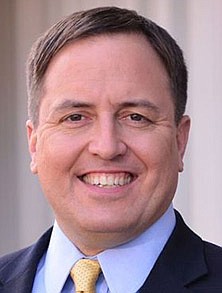An hour-long debate ensued Wednesday night between Missouri Secretary of State Jay Ashcroft and about 15 California residents at the Wood Place Library during a stop on Ashcroft's statewide tour to educate people on the state's new photo ID law.
The new law took effect June 1, requiring voters to show a government-issued photo ID, such as a driver's license, non-driver's license, passport or military ID. Voters without one of those can show another form of "secondary" identification like a utility bill or voter registration card, then sign a statement acknowledging the new law.
People without any form of ID can cast a provisional ballot that will count if they return to the polling place with an ID or if the signature on the ballot matches the voter registry.
Ashcroft pushed back against residents who said the new law would suppress votes in Missouri. He reiterated the message people will be able to vote if they are registered.
"Regardless of what you've heard, don't be confused," Ashcroft said. "If you're a registered voter, go to your polling place on Election Day and you can vote."
California resident Taunia Adams questioned the effectiveness of Ashcroft's advertising campaign, pointing out the small number of people at Wednesday's meeting.
"I don't have 8,400 friends in this county, I can't tell all of them," Adams said.
Ashcroft said his office has spent money on radio, television and online advertisements. His office also has worked to train election authorities on the new law in more than 50 counties that will have August elections.
Special elections in New Madrid and St. Louis City have been the first under the new law, with no major problems being reported.
"The neat thing about this law," Ashcroft said, "is that people that didn't even know about this change; it was seamless for them to vote."
People who do not have a government-issued ID can receive a free non-driver's license. His office will mail letters to people who sign the statement when they vote to give them information on how to get a free ID.
"Then we'll really need to know exactly who we need to be reaching out to," Ashcroft said.
In the St. Louis special election Tuesday, 91 percent of voters used a driver's license as a form of ID, according to data collected by the secretary of state's office. Voter ID cards were used by 6.5 percent, and just over 0.5 percent of people used "other" identification.
"I think photo ID is great," Ashcroft said. "I think it gives people better confidence that their vote will count, and it won't be negated by fraudulent activity."
Some residents were concerned about Ashcroft turning over voter information requested by President Donald Trump's voter fraud commission.
Ashcroft said the information hasn't been given to the commission yet, after it requested states hold off until a lawsuit against the commission is resolved.

